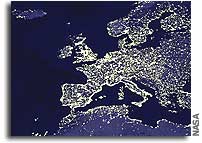EISC pushes for a strong European presence in space

Pressing national governments and European institutions to adopt a common strategy for space, the European Interparliamentary Space Conference (EISC) is a permanent forum for cooperation between the European national parliaments, aimed at developing a continuing dialogue on space policy issues. It has consistently stressed the importance of space, calling it “central to the evolution of the world community in the twenty-first century”, and has worked to ensure that space-delivered services for European citizens are provided by a vigorous and globally competitive
The current crisis caused by the downturn in the crucial commercial satellite telecommunications market calls for a new approach. The EISC is supporting closer collaboration between the European Commission, the European Space Agency (ESA), Member States and national agencies under a new Framework Agreement, with the aim of establishing a permanent and effective mechanism for implementing and maintaining a European Space Strategy.
European autonomy is key
Underpinning the major space programme areas is Europe’s need for self-sufficiency in key strategic technologies, including, for example, electronic and optical components. To achieve this, the EISC envisages the re-structuring of ESA’s framework ARTES (Advanced Research in Telecommunications Systems) programmes along more flexible and potential market-related lines. Given the current slump in commercial markets and overcapacity in the telecommunications satellite sector, a vigorous technology programme is required to ensure that Europe remains a global leader in space.
The space science research programmes of the EU, ESA and the Member States are also of great importance, but Europe’s strategic independence will hinge largely on its success in certain key space applications areas, specifically the GALILEO satellite navigation system and the GMES initiative
Role for Candidate Countries and Russia
Significantly, the EISC has recognised the potential contribution of the Candidate Countries to European space, welcoming the initiative taken by the European Commission and ESA at the Warsaw Space Seminar in July 2002, which promoted collaboration among an expanding group of old and new partners.
Lastly, autonomy for Europe implies control over all the key elements of the space supply chain, where launchers play a critical role. The EISC therefore notes with satisfaction the establishment in December 2001 of an EC/ESA/Rosaviakosmos joint statement on a “Euro-Russian Space Partnership’ and the subsequent collaborative activities initiated with the Russian Federation, including the EU-Russia workshop. The Russians have a long history of successful space launches and are seen as a key strategic partner in this area. The EISC urges ESA, the European Commission and Member States to continue building closer relationships with the United States, Japan and other space nations that wish to co-operate, with the objective of promoting future joint national and international projects, especially where there is the potential for commercial exploitation.
Focus on the future
Space affects the daily lives of European citizens in many different ways. The space infrastructure and the services it enables are all-pervasive, and space-derived data is intrinsic to the organisation and operation of modern society. In addition, space has opened up major new commercial markets and feeds many of the high technologies contributing to future commercial success at the global level. According to the EISC, the European Commission and the Member States must encourage the development of space applications throughout the industrial chain, including downstream sectors, to fully exploit the potential of space-based systems. This requires clear, forward thinking and the implementation of well-focused space programmes.
A busy schedule
The most recent EISC meeting, held in London from 12-14 November 2002 under the auspices of the UK Presidency of the EISC, included representatives from the Parliamentary Space Groups of Belgium, France, Germany, Italy, Spain and the United Kingdom as well as parliamentary delegations from Finland, Greece, Russia, Switzerland and the European Parliament. Representatives of the European Commission, the Western European Union, the ESA, National Space Agencies, and other institutions participated as observers. For more on the meeting, see the full Conclusions of the Presidency.
The next EISC meeting will be held in November 2003 in Berlin.









